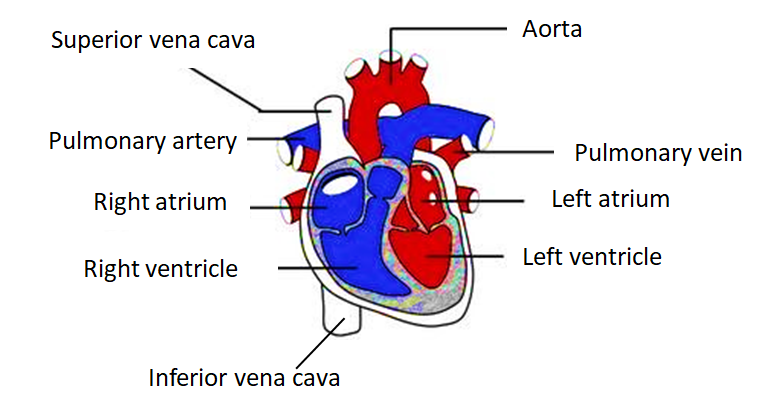
Blood vessel carrying blood from the lungs to the heart is
(a)Pulmonary artery
(b)Pulmonary vein
(c)Coronary artery
(d)None of the above
Answer
593.4k+ views
Hint: The heart is a vital organ that continuously pumps oxygen and nutrient-rich blood all around our body to sustain life. As the heartbeats, it pumps blood through a system of blood vessels called the circulatory system.
Complete answer:
A blood vessel that carries blood from the lungs to the heart is the ‘Pulmonary vein’. There are three main types of blood vessels, namely, arteries, capillaries, and veins.
The major blood vessels connected to our heart are the aorta, the superior vena cava, the inferior vena cava, the pulmonary artery which takes O₂ poor blood from the heart top the lungs where it gets oxygenated, the pulmonary veins which bring O₂ rich blood from the lungs to the heart and the coronary artery which supplies blood to the heart muscle.
Additional information:
Double circulation means that blood passes through the heart twice for each circuit of the body. It includes Pulmonary and Systemic circulation.
Pulmonary circulation- The deoxygenated blood pumped into the pulmonary artery is passed to the lungs from where the oxygenated blood is carried by pulmonary veins into the left atrium. This pathway is termed as pulmonary circulation.
Systemic circulation- The oxygenated blood which moves into the aorta is moved by a network of arteries, arterioles, and capillaries to the tissues from where the deoxygenated blood is gathered by a system of veins, venules, and vena cava and discharged into the right atrium. This is systemic circulation.
So, the correct answer is ‘Pulmonary Vein’.
Note:
Blood is essential. In addition to carrying fresh oxygen from lungs and nutrients to our body tissues, it also takes the body’s waste products including CO₂, away from the tissues. This is necessary to sustain life.

Complete answer:
A blood vessel that carries blood from the lungs to the heart is the ‘Pulmonary vein’. There are three main types of blood vessels, namely, arteries, capillaries, and veins.
The major blood vessels connected to our heart are the aorta, the superior vena cava, the inferior vena cava, the pulmonary artery which takes O₂ poor blood from the heart top the lungs where it gets oxygenated, the pulmonary veins which bring O₂ rich blood from the lungs to the heart and the coronary artery which supplies blood to the heart muscle.
Additional information:
Double circulation means that blood passes through the heart twice for each circuit of the body. It includes Pulmonary and Systemic circulation.
Pulmonary circulation- The deoxygenated blood pumped into the pulmonary artery is passed to the lungs from where the oxygenated blood is carried by pulmonary veins into the left atrium. This pathway is termed as pulmonary circulation.
Systemic circulation- The oxygenated blood which moves into the aorta is moved by a network of arteries, arterioles, and capillaries to the tissues from where the deoxygenated blood is gathered by a system of veins, venules, and vena cava and discharged into the right atrium. This is systemic circulation.
So, the correct answer is ‘Pulmonary Vein’.
Note:
Blood is essential. In addition to carrying fresh oxygen from lungs and nutrients to our body tissues, it also takes the body’s waste products including CO₂, away from the tissues. This is necessary to sustain life.

Recently Updated Pages
Master Class 11 Computer Science: Engaging Questions & Answers for Success

Master Class 11 Business Studies: Engaging Questions & Answers for Success

Master Class 11 Economics: Engaging Questions & Answers for Success

Master Class 11 English: Engaging Questions & Answers for Success

Master Class 11 Maths: Engaging Questions & Answers for Success

Master Class 11 Biology: Engaging Questions & Answers for Success

Trending doubts
One Metric ton is equal to kg A 10000 B 1000 C 100 class 11 physics CBSE

There are 720 permutations of the digits 1 2 3 4 5 class 11 maths CBSE

Discuss the various forms of bacteria class 11 biology CBSE

Draw a diagram of a plant cell and label at least eight class 11 biology CBSE

State the laws of reflection of light

Explain zero factorial class 11 maths CBSE




